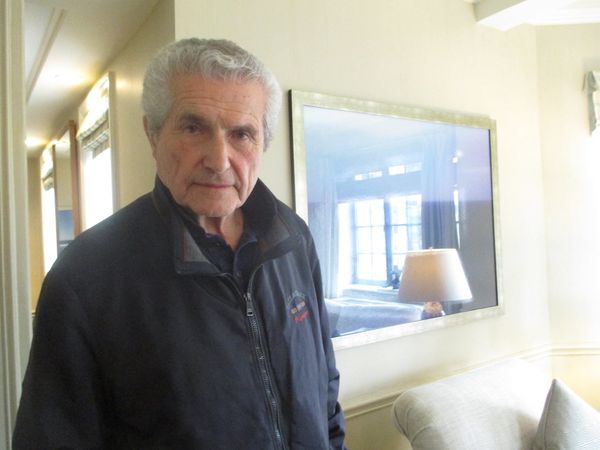 |
| Claude Lelouch on influencing Terrence Malick: "I'm happy that you say so." Photo: Anne-Katrin Titze |
When I spoke with Claude Lelouch at his hotel in New York less than two years ago, he believed that The Best Years Of A Life (Les Plus Belles Années D'Une Vie), starring Jean-Louis Trintignant, Anouk Aimée, and Monica Bellucci would be his last.
Now he has La Vertu Des Impondérables with Elsa Zylberstein (Un + une with Jean Dujardin and Christopher Lambert), Marianne Denicourt (Frédéric Tellier's SK1 with Nathalie Baye, Raphaël Personnaz and Olivier Gourmet), Ary Abittan, and Stéphane De Groodt (Israel Horovitz's My Old Lady) in the works.
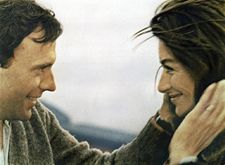 |
| Claude Lelouch: "In Un Homme Et Une Femme (A Man And A Woman), when Anouk Aimée arrives at the end on the train platform, she didn't know Jean-Louis Trintignant would be there." |
In 1966, Un Homme Et Une Femme won the Cannes Palme d'Or (tied with Pietro Germi's The Birds, The Bees And The Italians), and in 1967 won the Best Foreign Language Film Oscar, and Claude Lelouch took Best Writing, Story and Screenplay honours with Pierre Uytterhoeven. Anouk Aimée took home a Best Foreign Actress BAFTA.
Anne-Katrin Titze: I would like to ask you about your work with actors. I know that for the early films, Un homme et une femme, for example, the actors didn't know what the other character was going to do. Is this the method you are still using?
Claude Lelouch: Yes, I still do that because I think it's what makes my films singular. There's a paradox which is that what I don't like in cinema is when cinema is like cinema. I ask actors not to act. I ask them to try to become human again.
Actors pretend, human beings don't. It's that difference that I try to film. So I make my actors live my films like they're living real life. If we knew the date of our death ahead of time, we would not behave or do the same things in life.
AKT: True.
CL: And it's the same thing when actors know the end of the story, it's kind of a cheat. And you feel that cheat through the whole film. I try to make that cheat not exist in my films and I live the story with my actors. And I'm able to change the story every single day because I'm also the writer of the screenplay. In my eyes, a story is not a prison, a screenplay is a prison.
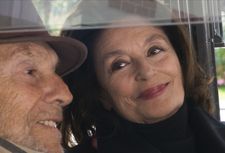 |
| Claude Lelouch: "When I start a story, I can't shoot a film if I know the end." |
AKT: Terrence Malick stole that from you?
CL: I'm happy that you say so.
AKT: That means you always film in chronological order?
CL: Yes. Always. It's very important. Otherwise it would be contrary to life, you know. My story started with my birth to go I don't know exactly where. I don't know how it's going to end and that's exciting. If I had been told my whole life at birth it would be boring. And that's why I've never been bored. Because I've never read the script.
AKT: Is there an ending to one of your films that you didn't expect at all? That surprised you?
CL: With all my films, I never found the end until the end of the shoot. After I had seen my actors act, after I had witnessed the story and filmed it. When I start a story, I can't shoot a film if I know the end. That would be like knowing the date of my death. I love to have the start of the film and a few points. I love to play with the film the way life plays with me.
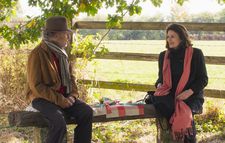 |
| Claude Lelouch: "Actors pretend, human beings don't. It's that difference that I try to film. So I make my actors live my films like they're living real life." |
In Un Homme Et Une Femme, when Anouk Aimée arrives at the end on the train platform, she didn't know Jean-Louis Trintignant would be there. I decided that fifteen minutes before we shot. Normally she was supposed to arrive and be alone. And then at the last moment, like ten minutes before, I decided, no, no. And I brought him.
AKT: You can see the surprise on her face.
CL: I also have to say - my ends are not ends. I hate happy endings, I hate bad endings. What I love is hope. The best ending is hope. But there is no end, you know. We're in a story that never ends. The idea of end doesn't make any sense. And in fact, you never see the word end at the end of a movie anymore.
AKT: You are right, I never thought about it.
CL: Let me give you a last example. Imagine that I say to you: I'm going to take you to the movies but we're going to miss the first ten minutes and the last ten minutes. But we'd still been able to go to the movies together. That's exactly what life is like. We've come into a movie that started before us and we leave before the movie ends.
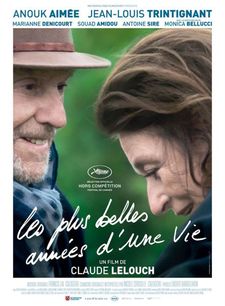 |
| Les Plus Belles Années D'Une Vie poster |
AKT: Søren Kierkegaard said “Life can only be understood backwards; but it must be lived forwards." I just heard while waiting for the elevator [from Philippe Azoulay] that you are planning another film.
CL: Well, I think the time has come for me to make my last film. I'm going to spend all my remaining strength, all my remaining money on making this film. I'm going to take lots of time to write, to prepare, to shoot.
I want to give myself this last gift and I want to take every risk that I never had the courage to take. I would like to avoid witnessing the release of the film. So that the film only be pleasure.
AKT: Thank you so much. I am wishing you all the best with it.
Read what Claude Lelouch had to say on never playing the easy card, experimenting with all the different feelings, liking disguises, his most beautiful memories, and one of Quentin Tarantino's favourite films.
Read what Claude Lelouch had to say on criminals in Le voyou, Lino Ventura and Charles Gérard in La bonne année, Un homme et une femme, Un + une, and traveling in Roman de gare.





















